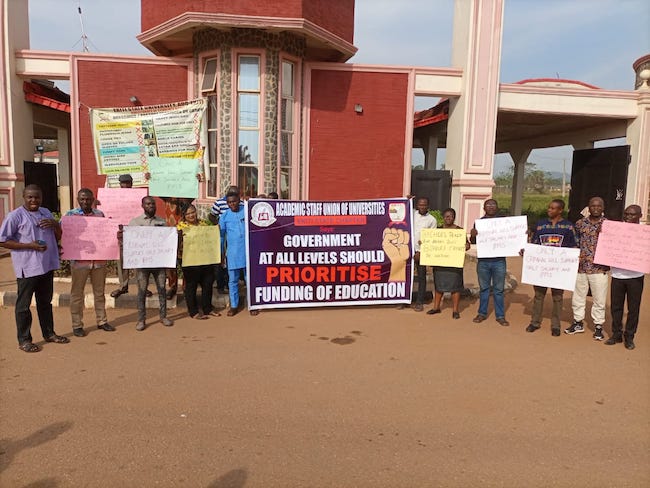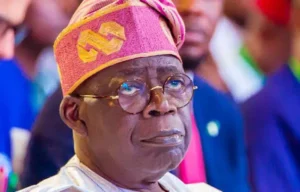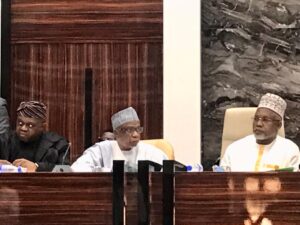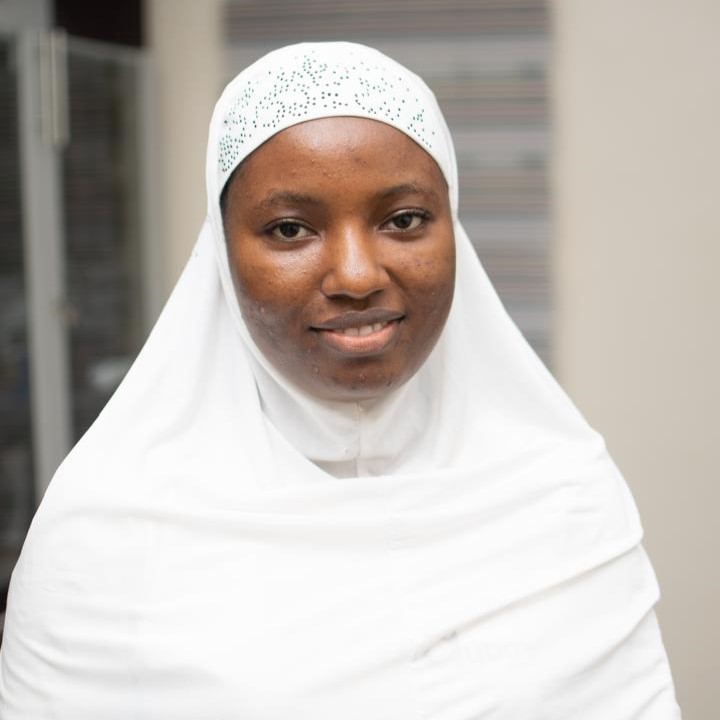The President of ASUU, Chris Piwuna, in this report, said the union is warming up for a comprehensive shutdown of Nigeria’s university campuses, accusing the President Bola Tinubu-led administration of taking the union for granted after its members have endured continued hardship for two years, hoping the promises would be kept.
The respite currently being enjoyed across Nigeria’s public university campuses may soon be truncated as the Academic Staff Union of Universities (ASUU), the umbrella body for university lecturers in the country, threatened a showdown.
ASUU said the benefit of the doubt it granted to the administration of President Bola Tinubu has been grossly abused.
Within the last two years, the nation’s university system has enjoyed relative peace with both academic and non-academic staff maintaining a fairly good relationship with the government, while expecting that the unresolved issue of failed implementation of the 2009 FGN-University-based Workers’ Unions’ Agreement would be addressed.
However, in an exclusive interview with DevReporting, the newly elected President of ASUU, Chris Piwuna, a Professor of Medicine and Consultant Psychiatrist at the University of Jos Teaching Hospital, Plateau State, said the waiting period is over.
According to Mr Piwuna, it has been 16 years since the union entered into an agreement with the Nigerian government on practical steps to address critical issues affecting the country’s university system, and more than seven years since the renegotiation of the same agreement started, yet without success.
“The document, which was freely signed in 2009, speaks to the issues of university autonomy, funding, academic freedom, and staff welfare, among others. But since the agreement was signed till today, what was supposed to have been implemented progressively upon expected constant renegotiation has been left to gather dust.

“What we have in terms of remuneration, instead of reviewed salaries, is a wage award. Even on the wage awards of 25-35 per cent, our members are owed more than 12 months now. And when they talk about the new minimum wage, what we receive is a N40,000 increment,” he said.
READ ALSO: INTERVIEW: Drug abuse among UNIABUJA students alarming, cuts across both genders – Ex-VC Maikudi
The ASUU president said graduate assistants in public universities who were earning between N90,000 and N95,000 before the new minimum wage now receive between N135,000 and N160,000, while a professor at the peak of promotion goes home with less than N500,000.

He said the currency devaluation by Mr Tinubu has further worsened the situation, noting that the monthly pay of a Nigerian professor now stands at about $300.
“So, I can tell you that our members are getting agitated; they are getting restless. If you look at our chat groups, all the universities, that is what our members are talking about, because it is becoming very unbearable for them to go to work, feed, pay school fees, and take care of their families. So, it has reached the point where we think that the honeymoon with the government is over. I repeat, the honeymoon with the government is over. This renegotiation is over,” he added.
Contentious FG/ASUU agreement
In 2009, the Nigerian government and the leadership of ASUU signed an agreement containing steps and pathways to revitalising the nation’s university system. From staff welfare to proper funding, curriculum review to academic freedom, among other pertinent issues, both the government and the union believed that if diligently implemented, the document was the magic wand needed to turn around the fortunes of the nation’s university system.
ASUU said the agreement was meant to be renegotiated every four or five years in line with economic realities and global development.
However, the agreement that was due for renegotiation between 2013 and 2014 received no attention until 2017, when a committee led by Wale Babalakin, a Senior Advocate of Nigeria (SAN), was set up by the then Minister of Education, Adamu Adamu.
ASUU had kicked against the appointment of Mr Babalakin as the chairman of the committee, describing him as a subtle dictator and “not a negotiator.” Though the government refused to budge, the committee recorded no progress until 2020, when Mr Babalakin resigned from his position both as the Chairman of the renegotiation committee and in his capacity as the pro chancellor of the University of Lagos (UNILAG), Akoka, his alma mater.
Mr Babalakin’s resignation was connected to his persistent conflicts with the then Vice-Chancellor of the university, Oluwatoyin Ogundipe, who was suspended by Mr Babalakin-led governing council over what many described as irreconcilable differences.
Meanwhile, less than three months after Mr Babalakin threw in the towel, the government, in December 2020, reconstituted the committee led by Munzali Jibril, an emeritus professor. The committee submitted its report in May 2021, but it was not discussed further until 2022, when another emeritus professor, Nimi Briggs, was appointed to lead fresh renegotiation efforts.
Mr Biggs-led committee, in June 2022, while a prolonged industrial action by ASUU was ongoing, submitted its report. However, it took the intervention of the National Industrial Court to end the then eight-month-long strike by the union.
Since the union suspended its strike in December 2022, there had been no conversation on the agreement again until October 2024, when another committee led by the former Secretary to the Government of the Federation, Yayale Ahmed, was constituted.

One week after the inauguration of the Yayale-led committee, the then Minister of Education, Tahir Mamman, was sacked.
READ ALSO: Admission Quota: Nigerian university’s dental students stranded as MDCN fumes
“With exception of Babalakin’s, all committees have done great job”
According to the ASUU president, the Yayale-led committee turned in its report in December 2024, but more than seven months later, the government has continued to look the other way.
Mr Piwuna said the delay tactics by the government was part of the ploy to destroy public university education, so that “the private universities being built by the elite class who are in government can survive.”
He thanked the various individuals who had worked to produce the reports submitted to the government at different times, saying, “except for Mr Babalakin, every other chairman of the various committees stood out in pedigree, character, and conduct.”
Other issues
The union president added that one of the consequences of the failure to implement the agreement over the years includes the exodus of Nigerian lecturers abroad, saying lecturers across all cadres are leaving in droves without replacements.
“I will give you an example. Here in Jos (UNIJOS), just last week, a department head told me that they have lost seven lecturers in their department in the space of two years. When we are busy trying to show understanding with this government and they are not acting, our members are leaving. We are not going that way anymore. There are so many examples,” Mr Piwuna said.
“I know Professors of Medicine who have left the shores of this country because the condition is just unbearable for them. Those of us who have stayed back to contribute, to change and stabilise the system are being treated with disdain by the government at both the federal and state levels. For how long are we going to take that?” he asked.
Asked about the N40 billion Earned Academic Allowance (EAA) paid to the union by the Federal Government recently, Mr Piwuna said what was paid was just part of the backlog owed to his union members.
He noted that the union had since suggested that the government should embed the EAA in lecturers’ salaries to avoid separate requests that make it look like fresh requests whenever legitimate agitation is made.
The union leader also spoke about the university autonomy and the proliferation of what he described as “mushroom” universities, saying it is disturbing that the Nigerian government has turned supposed ivory towers into constituency projects.
Asked why his union is not considering other options apart from industrial action, the ASUU president said he would be surprised if Nigerians could raise such a poser, noting that within the last two years, it had endured the hardship while exploring alternatives.
“Do you think that in the last two years of this government, we’ve not been exploring other options? Even this week, we communicated with the education minister. But we are tired of talking and empty promises. We are tired of endless cycles. If Nigerians see any action from ASUU, they should not assume that that’s the first thing that we are doing. Within the last two years, we’ve been talking, and we’ve written letters. Enough is enough!” he said.
Note: In the full interview, which will be published soon, the President speaks on ASUU’s position on various issues of national interest, including members’ participation in elections, moral and academic corruption on campuses, budgetary allocations, and the unresolved crisis between the union and its breakaway unions, such as CONUA and NAMDA, among other issues.



